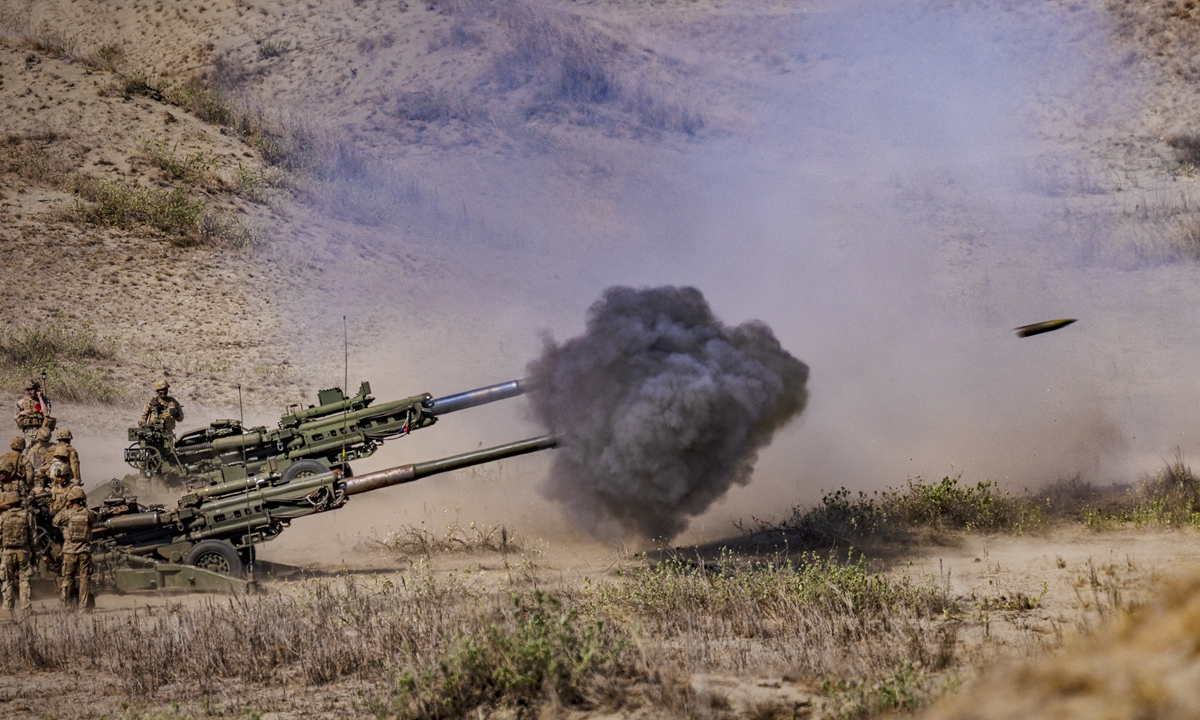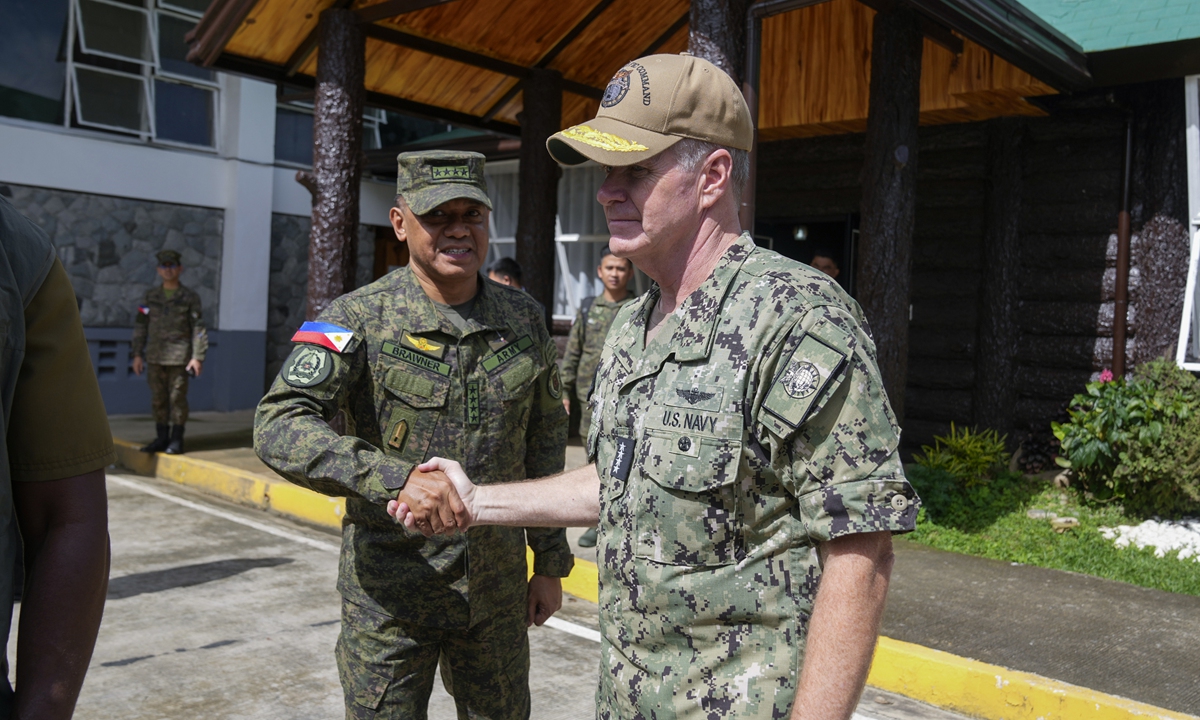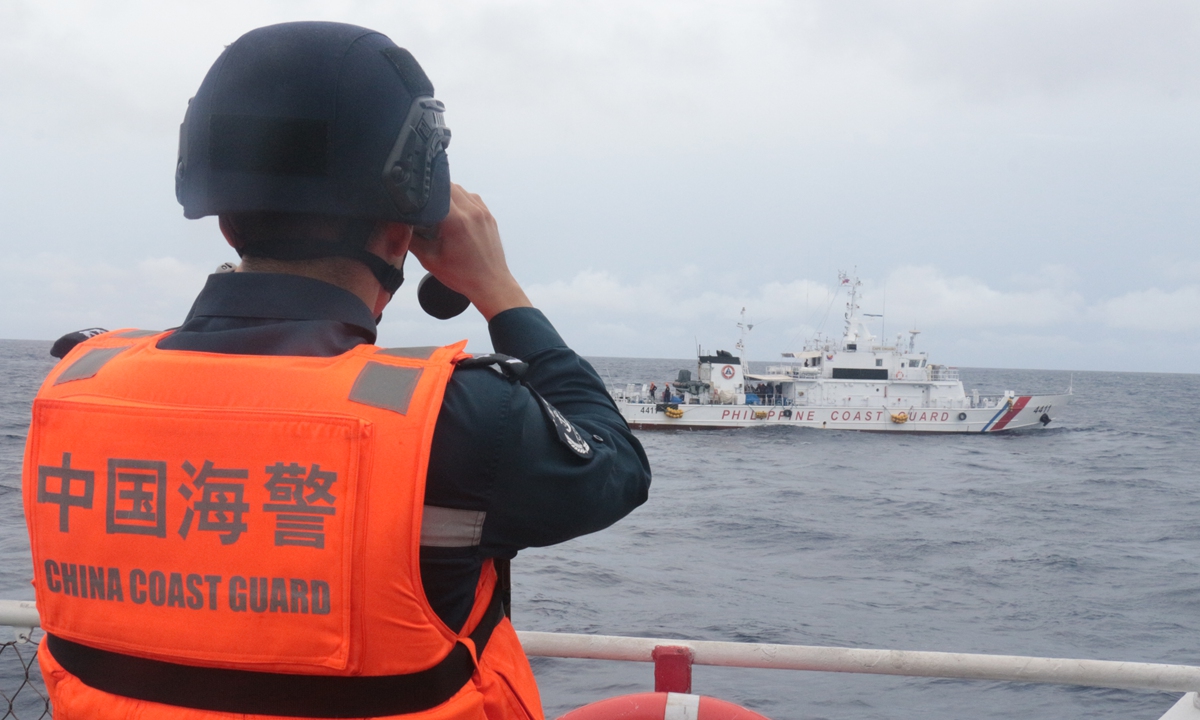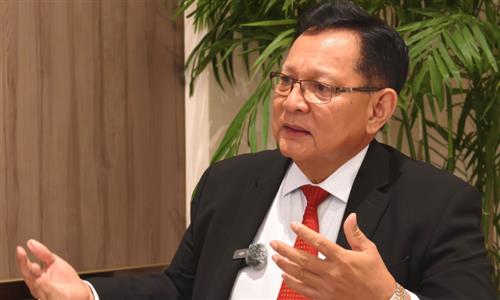IN-DEPTH / IN-DEPTH
GT investigates: How US military-industrial complex orchestrates narrative campaigns against China and pushes Philippines to forefront
Editor's Note:
"Cognitive Warfare" has become a new form of confrontation between states, and a new security threat. With new technological means, it sets agendas and spreads disinformation, to change people's perceptions and thus alter their self-identity. Launching cognitive warfare against China is an important means for Western anti-China forces to attack and discredit the country.
Some politicians and media outlets have publicly smeared China's image by propagating false narratives in an attempt to incite and provoke dissatisfaction with China among people in certain countries. These means all serve the US strategy to contain China's rise and maintain its hegemony. The Global Times is publishing a series of articles to reveal the intrigues of the US and its allies' China-targeted cognitive warfare and expose its lies and vicious intentions.
In the 17th installment of the series, the Global Times revealed how the US military-industrial complex orchestrates cognitive warfare campaigns against China to incite the Philippines to confront China, how the US government has transitioned from the forefront to the background to exert influence on the Philippines, and what tactics have been used in these cognitive wars.

From manipulating public opinion through hyping the South China Sea issue to launching smear campaign against Chinese vaccines in the Philippines, the US military-industrial complex has been exposed for persistently instigating the Philippines behind the scenes to fabricate biased or false narratives and foment public misunderstanding regarding China.
Experts warned that this strategy risks pushing the Philippines toward greater conflict and jeopardizes its own interests.
What lobbying groups are behind these cognitive warfare efforts against China? What ties do they have to the US Department of Defense, the US government, and the Philippine military? And ultimately, what tactics do they employ in their coordinated cognitive warfare assault? This investigative report aims to unravel these dirty tricks.
Military forces disguised as think tanks
In the process of supporting the Philippines in provoking disputes with China over the South China Sea, there is a non-negligible American think tank behind the scenes, known as Project Myoushu at Stanford University, which focuses on South China Sea security issues.
The project became well-known to the public due to a notorious smear campaign against the China Coast Guard (CCG) in February 2023. Project Myoushu claimed that China had harassed the Philippines Coast Guard (PCG) vessel by citing a so-called source. Subsequently, the PCG asserted that a Chinese ship had directed a laser at the PCG, while then US State Department spokesperson, Ned Price, further fanned the flames by stating that the US stands with its ally in the face of alleged laser incidents. The Chinese Foreign Ministry later clarified the facts, saying that the CCG's on-site operations are professional and res trained, and the claim made by the Philippines has no basis in fact.
Taking its name from an "inspired move" in the ancient Chinese game Go, Project Myoushu was established in 2022. Ray Powell, who served in the US Air Force and currently leads Project Myoushu at Stanford University's Gordian Knot Center for National Security Innovation, is an active figure in the narrative campaign against China on the South China Sea issue.
Reports show that Powell had served 35 years in the US Air Force, including a posting in the Philippines. After retiring in November 2021, Powell joined Stanford University as a research fellow.
In July 2023, Ray Powell visited with then Vice Admiral Alberto Carlos of Western Command to discuss "how to leverage emerging technologies to help improve maritime domain awareness and illuminate gray-zone activities in the West Philippine Sea," according to SeaLight's website, an organization at Stanford University that Powell led.
The term "gray zone activity" has been used by some officials and scholars in the US to discredit China's policies and legal actions in the South China Sea. They use this term to accuse China of employing non-military means to "change the status quo" or "create tension."
"This is a blatant inversion of reality. In fact, labeling China with various cognitive tags regarding the South China Sea issue is itself a manifestation of the US' use of the 'gray zone' strategy," said Ding Duo, deputy director of the Institute of Maritime Law and Policy at the National Institute for South China Sea Studies.
Powell has also given interviews to US-funded media sources to support the Philippines or levy groundless accusations against China over the South China Sea issue.
In addition to Powell and Project Myoushu, another think tank with military ties has been found to openly intervene in the South China Sea issue.
According to an article in the US Naval Institute's magazine Proceedings, the US Naval Institute initiated the Maritime Counterinsurgency (COIN) Project in July 2022, with support from the Carnegie Corporation of New York.
The project is specifically aimed at China's activities in the South China Sea, as it has claimed that "China is working below the threshold of armed conflict to subjugate the large civilian maritime population of Southeast Asia [...] who depend on access to the South China Sea for their daily livelihoods."
The initial concept of Maritime COIN has sparked intense discussion in the US and its partners since 2019. Several high-ranking US military officers, including Admiral John Aquilino, Vice Admiral William Merz, and Rear Admiral Fred Kacher, have been influenced by this concept.
According to the US Naval Institute, the Maritime COIN has published 19 articles from July 2022 to April 2024, and many of the authors have US military backgrounds. A retired Philippine rear admiral is also among them.
US arms firms also have stakes in the South China Sea issue. According to the arms transfers database of the Stockholm International Peace Research Institute (SIPRI), the US has transferred many pieces of military equipment including aircrafts, ships, missiles, armored vehicles, and engines to the Philippines over the last 10 years.
Manila is also planning to procure a US-made Typhon mid-range capability missile system, according to Armed Forces of the Philippines chief General Romeo Brawner Jr, the Philippine Daily Inquirer reported on August 29.
Observers said that US weapon makers are eager to see tensions in the South China Sea rise, so that they can sell more of their products to make profits.

Sophisticated network built on cognitive warfare players
The influence of the US military-industrial complex extends beyond the South China Sea issue, bleeding into other areas as well.
In June, Reuters published an investigative report revealing that during the height of the COVID-19 pandemic, the US military secretly launched a campaign to counter what it saw as China's growing influence in the Philippines. At the time, the Philippines had one of the worst inoculation rates in Southeast Asia.
Citing three former US military officials, a Reuters report referenced the operation as having been pushed by then US Special Operations Command Pacific General Jonathan Braga, who was reportedly a longtime advocate of increasing the use of propaganda operations as a tool in the global geopolitical competition.
The Pentagon's audit concluded that the military's primary contractor handling the campaign, General Dynamics IT, a US-based global aerospace and defense company, had employed sloppy tradecraft, taking inadequate steps to hide the origin of the fake accounts, according to a person with direct knowledge of the review, Reuters reported.
Why did the US launch such a cognitive war against Chinese vaccines? Reuters provides an answer: To counter what it perceived as China's growing influence in the Philippines. At the time, the Philippines had received vaccine aid from China, while US-produced vaccines had not yet been introduced in the Philippines.
These highly similar tactics lead to a suspicion of a connection between the narrative campaigns over the South China Sea and Chinese vaccines. Following the clues, the Global Times discovered that the key figures behind both operations are intricately linked.
The Global Times found that Braga, one of the initiators of the vaccine campaign, once visited the Hoover Institution in February 2020, engaging fellows in a roundtable discussion about the threats his command faced in the region. One of the fellows he met with is research fellow Joseph Felter.
The ties between the two individuals go far beyond this. Felter once served in the US Army Special Forces, while Braga was quickly reassigned to command the US Army Special Operations Command in mid-2021 after the launch of the vaccine campaign against China.
Joe Felter, as the former deputy assistant secretary of Defense for South and Southeast Asia, is familiar with the situation in Southeast Asia, including the Philippines. He served as the principal advisor to senior US Department of Defense leadership for all policy matters pertaining to the development and implementation of defense strategies and plans for the region. Felter's resume shows that he has also been a military attaché in the Philippines.
Moreover, he also co-founded the defense company BMNT, which has close ties to the Pentagon and US military giants like Lockheed Martin and Northrop Grumman, according to the company's official website. Felter's role as a bridge between the US military and the Philippines has since become clear.
Felter is the director of Stanford University's Gordian Knot Center for National Security Innovation. This indicates that Powell, while working on Project Myoushu, is required to report to Felter as the head of the center.
The intricate connections between Powell, Braga, and Felter, along with their profound military backgrounds, make the player network picture behind two typical cognitive wars against China much clearer.

A significant shift in strategy
The connections also highlighted a significant shift in the US' strategy: The military-industrial complex has begun to play an active role in the cognitive war against China.
"The US military-industrial complex is often involved in many global conflicts. Driven by its own interests, it benefits from escalating regional tensions," Chen Xiangmiao, director of the World Navy Research Center at the National Institute for South China Sea Studies, told the Global Times.
By creating instability in the region, the complex aims to stimulate demand from countries around the South China Sea, thereby fulfilling its economic interests, he noted.
The military-industrial complex seeks to leverage these initiatives to encourage the US Congress to approve larger budgets and to push the US Department of Defense to procure more weapons, Chen said.
The interests of the military-industrial complex are clearly driving the US strategy of cognitive warfare against China, Chen noted.
The expert further stated it is clear to see that the US government has shifted from a front-stage role to a behind-the-scenes one. This can help avoid direct involvement in controversies that may provoke public resentment or skepticism, as well as prevent "factual conflicts" with China.
Meanwhile, by packaging think tanks as neutral and objective "academic authorities," the US can better exert global public opinion pressure, according to Chen.
"This strategy may push the Philippines to escalate tensions in the region, ultimately jeopardizing its own interests. The Philippines is by no means the winner of the cognitive war," he stressed.
"Cognitive Warfare" has become a new form of confrontation between states, and a new security threat. With new technological means, it sets agendas and spreads disinformation, to change people's perceptions and thus alter their self-identity. Launching cognitive warfare against China is an important means for Western anti-China forces to attack and discredit the country.
Some politicians and media outlets have publicly smeared China's image by propagating false narratives in an attempt to incite and provoke dissatisfaction with China among people in certain countries. These means all serve the US strategy to contain China's rise and maintain its hegemony. The Global Times is publishing a series of articles to reveal the intrigues of the US and its allies' China-targeted cognitive warfare and expose its lies and vicious intentions.
In the 17th installment of the series, the Global Times revealed how the US military-industrial complex orchestrates cognitive warfare campaigns against China to incite the Philippines to confront China, how the US government has transitioned from the forefront to the background to exert influence on the Philippines, and what tactics have been used in these cognitive wars.

US and Philippine troops fire howitzers as they take part in a counter landing live fire exercise as part of US-Philippines joint military exercises on May 6, 2024, in Laoag, the Philippines. Photo: VCG
From manipulating public opinion through hyping the South China Sea issue to launching smear campaign against Chinese vaccines in the Philippines, the US military-industrial complex has been exposed for persistently instigating the Philippines behind the scenes to fabricate biased or false narratives and foment public misunderstanding regarding China.
Experts warned that this strategy risks pushing the Philippines toward greater conflict and jeopardizes its own interests.
What lobbying groups are behind these cognitive warfare efforts against China? What ties do they have to the US Department of Defense, the US government, and the Philippine military? And ultimately, what tactics do they employ in their coordinated cognitive warfare assault? This investigative report aims to unravel these dirty tricks.
Military forces disguised as think tanks
In the process of supporting the Philippines in provoking disputes with China over the South China Sea, there is a non-negligible American think tank behind the scenes, known as Project Myoushu at Stanford University, which focuses on South China Sea security issues.
The project became well-known to the public due to a notorious smear campaign against the China Coast Guard (CCG) in February 2023. Project Myoushu claimed that China had harassed the Philippines Coast Guard (PCG) vessel by citing a so-called source. Subsequently, the PCG asserted that a Chinese ship had directed a laser at the PCG, while then US State Department spokesperson, Ned Price, further fanned the flames by stating that the US stands with its ally in the face of alleged laser incidents. The Chinese Foreign Ministry later clarified the facts, saying that the CCG's on-site operations are professional and res trained, and the claim made by the Philippines has no basis in fact.
Taking its name from an "inspired move" in the ancient Chinese game Go, Project Myoushu was established in 2022. Ray Powell, who served in the US Air Force and currently leads Project Myoushu at Stanford University's Gordian Knot Center for National Security Innovation, is an active figure in the narrative campaign against China on the South China Sea issue.
Reports show that Powell had served 35 years in the US Air Force, including a posting in the Philippines. After retiring in November 2021, Powell joined Stanford University as a research fellow.
In July 2023, Ray Powell visited with then Vice Admiral Alberto Carlos of Western Command to discuss "how to leverage emerging technologies to help improve maritime domain awareness and illuminate gray-zone activities in the West Philippine Sea," according to SeaLight's website, an organization at Stanford University that Powell led.
The term "gray zone activity" has been used by some officials and scholars in the US to discredit China's policies and legal actions in the South China Sea. They use this term to accuse China of employing non-military means to "change the status quo" or "create tension."
"This is a blatant inversion of reality. In fact, labeling China with various cognitive tags regarding the South China Sea issue is itself a manifestation of the US' use of the 'gray zone' strategy," said Ding Duo, deputy director of the Institute of Maritime Law and Policy at the National Institute for South China Sea Studies.
Powell has also given interviews to US-funded media sources to support the Philippines or levy groundless accusations against China over the South China Sea issue.
In addition to Powell and Project Myoushu, another think tank with military ties has been found to openly intervene in the South China Sea issue.
According to an article in the US Naval Institute's magazine Proceedings, the US Naval Institute initiated the Maritime Counterinsurgency (COIN) Project in July 2022, with support from the Carnegie Corporation of New York.
The project is specifically aimed at China's activities in the South China Sea, as it has claimed that "China is working below the threshold of armed conflict to subjugate the large civilian maritime population of Southeast Asia [...] who depend on access to the South China Sea for their daily livelihoods."
The initial concept of Maritime COIN has sparked intense discussion in the US and its partners since 2019. Several high-ranking US military officers, including Admiral John Aquilino, Vice Admiral William Merz, and Rear Admiral Fred Kacher, have been influenced by this concept.
According to the US Naval Institute, the Maritime COIN has published 19 articles from July 2022 to April 2024, and many of the authors have US military backgrounds. A retired Philippine rear admiral is also among them.
US arms firms also have stakes in the South China Sea issue. According to the arms transfers database of the Stockholm International Peace Research Institute (SIPRI), the US has transferred many pieces of military equipment including aircrafts, ships, missiles, armored vehicles, and engines to the Philippines over the last 10 years.
Manila is also planning to procure a US-made Typhon mid-range capability missile system, according to Armed Forces of the Philippines chief General Romeo Brawner Jr, the Philippine Daily Inquirer reported on August 29.
Observers said that US weapon makers are eager to see tensions in the South China Sea rise, so that they can sell more of their products to make profits.

Chief of Staff of Philippine Armed Forces General Romeo Brawner Jr (left), shakes hands with US Indo-Pacific Command Commander Admiral Samuel Paparo after a press conference on the Mutual Defense Board-Security Engagement Board held at the Philippine Military Academy in Baguio on August 29, 2024. Photo: VCG
Sophisticated network built on cognitive warfare players
The influence of the US military-industrial complex extends beyond the South China Sea issue, bleeding into other areas as well.
In June, Reuters published an investigative report revealing that during the height of the COVID-19 pandemic, the US military secretly launched a campaign to counter what it saw as China's growing influence in the Philippines. At the time, the Philippines had one of the worst inoculation rates in Southeast Asia.
Citing three former US military officials, a Reuters report referenced the operation as having been pushed by then US Special Operations Command Pacific General Jonathan Braga, who was reportedly a longtime advocate of increasing the use of propaganda operations as a tool in the global geopolitical competition.
The Pentagon's audit concluded that the military's primary contractor handling the campaign, General Dynamics IT, a US-based global aerospace and defense company, had employed sloppy tradecraft, taking inadequate steps to hide the origin of the fake accounts, according to a person with direct knowledge of the review, Reuters reported.
Why did the US launch such a cognitive war against Chinese vaccines? Reuters provides an answer: To counter what it perceived as China's growing influence in the Philippines. At the time, the Philippines had received vaccine aid from China, while US-produced vaccines had not yet been introduced in the Philippines.
These highly similar tactics lead to a suspicion of a connection between the narrative campaigns over the South China Sea and Chinese vaccines. Following the clues, the Global Times discovered that the key figures behind both operations are intricately linked.
The Global Times found that Braga, one of the initiators of the vaccine campaign, once visited the Hoover Institution in February 2020, engaging fellows in a roundtable discussion about the threats his command faced in the region. One of the fellows he met with is research fellow Joseph Felter.
The ties between the two individuals go far beyond this. Felter once served in the US Army Special Forces, while Braga was quickly reassigned to command the US Army Special Operations Command in mid-2021 after the launch of the vaccine campaign against China.
Joe Felter, as the former deputy assistant secretary of Defense for South and Southeast Asia, is familiar with the situation in Southeast Asia, including the Philippines. He served as the principal advisor to senior US Department of Defense leadership for all policy matters pertaining to the development and implementation of defense strategies and plans for the region. Felter's resume shows that he has also been a military attaché in the Philippines.
Moreover, he also co-founded the defense company BMNT, which has close ties to the Pentagon and US military giants like Lockheed Martin and Northrop Grumman, according to the company's official website. Felter's role as a bridge between the US military and the Philippines has since become clear.
Felter is the director of Stanford University's Gordian Knot Center for National Security Innovation. This indicates that Powell, while working on Project Myoushu, is required to report to Felter as the head of the center.
The intricate connections between Powell, Braga, and Felter, along with their profound military backgrounds, make the player network picture behind two typical cognitive wars against China much clearer.

On August 26, 2024, an officer from China Coast Guard monitors Philippine Coast Guard ship 4411 which ilegally intruded into waters near China's Xianbin Jiao. Photo: China Coast Guard
A significant shift in strategy
The connections also highlighted a significant shift in the US' strategy: The military-industrial complex has begun to play an active role in the cognitive war against China.
"The US military-industrial complex is often involved in many global conflicts. Driven by its own interests, it benefits from escalating regional tensions," Chen Xiangmiao, director of the World Navy Research Center at the National Institute for South China Sea Studies, told the Global Times.
By creating instability in the region, the complex aims to stimulate demand from countries around the South China Sea, thereby fulfilling its economic interests, he noted.
The military-industrial complex seeks to leverage these initiatives to encourage the US Congress to approve larger budgets and to push the US Department of Defense to procure more weapons, Chen said.
The interests of the military-industrial complex are clearly driving the US strategy of cognitive warfare against China, Chen noted.
The expert further stated it is clear to see that the US government has shifted from a front-stage role to a behind-the-scenes one. This can help avoid direct involvement in controversies that may provoke public resentment or skepticism, as well as prevent "factual conflicts" with China.
Meanwhile, by packaging think tanks as neutral and objective "academic authorities," the US can better exert global public opinion pressure, according to Chen.
"This strategy may push the Philippines to escalate tensions in the region, ultimately jeopardizing its own interests. The Philippines is by no means the winner of the cognitive war," he stressed.





